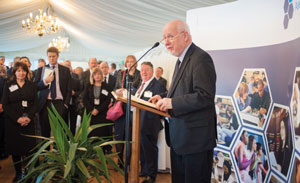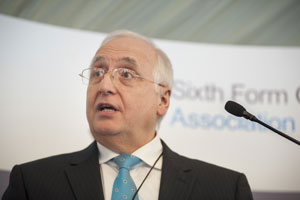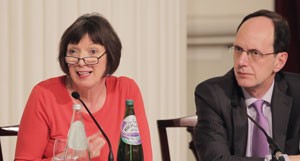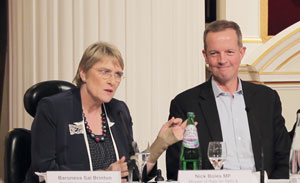
It’s that time again!
The second annual FE Week survey launches today with the aim of taking the sector’s pulse and delivering the results just in time for the general election on May 7.
And just like last year you could win an iPad Air and an FE Week subscription just for taking part.
The state-of-the-nation survey, again just like last year, is a joint project with the Policy Consortium and is open for a fortnight, closing on March 17.
“With the General Election less than ten weeks away, how has the Coalition Government fared in its stewardship of the FE and skills sector?” said Ian Nash, Policy Consortium member, freelance writer and journalist.
“The second annual survey by the Policy Consortium and media partner FE Week, launched today, will provide some measure of what staff and managers at all levels and all types of institution think.”
The wide-ranging survey embraces issues of governance, funding, Ofsted, learners, curriculum, local enterprise partnerships and plenty more besides.
It is aimed at, but by no means limited to, support staff, lecturers, directors, principals, chief executives and beyond, including those who work in unions, professional bodies and agencies.
Chris Henwood, FE Week editor, said: “The astounding success of last year’s survey meant there was no option but to do it again this year, especially with the promise of being able to deliver the sector’s message to political parties ahead of the election.
“What better reason to determine the views, priorities and moods of those in our sector about what is happening to it, what really matters and, indeed, what keeps those who work within it up at night.”
——————————————————————————————————————————————
Survey offers opportunity for ‘considered critique of current policies and strategies’
The first survey, Taking the pulse of education — the Great FE and Skills Survey of 2014, drew attention to serious shortcomings and misgivings, writes Ian Nash.
People responding used it to give a considered critique of current policies and strategies, not as an opportunity for a whinge-fest.
It is, therefore, worth reminding FE Week readers of some key findings (reported in edition 100 of FE Week, dated April 28, 2014 — see right) in advance of the 2015 survey.
Three concerns stood out, in well over a thousand responses, as meriting serious attention.
First, there were extremely high levels of concern over institutional funding, notably among the most senior staff best placed to measure the impact of spending cuts.
With pre-16 budgets protected, universities funded through fees and apprenticeships a priority, the already least-well resourced FE and adult provision was taking the greatest hit.
Second, there was considerable concern over the pace of change, whether in funding mechanisms, curriculum content or institutional arrangements.
The survey revealed a picture of sheer frustration as staff said they had little or no opportunity to get on and do a good job before the rules were changed yet again.
Third, there were serious criticisms of the way funds were being switched away from colleges and other providers, partly as an effort to cut costs, apparently without due regard for the consequences. Notable among such concerns was the greater use of large contractors and a proposal to transfer apprenticeship funding to employers.
Providers echoed concerns expressed by national organisations over the impact on engagement of small and medium-sized enterprises.
Also, the shift of funding for learners with costly, high-level special needs from the colleges to local authorities was attacked for dismantling a system that was understood and worked reasonably well, in favour of one that threatened to destabilise provision and restrict opportunities for vulnerable learners.
Ofsted came in for criticism too, with many respondents sceptical that it was independent of government and damagingly inconsistent in its judgments at local level, despite the inspection framework.
Overall, FE staff did not see government changes to the sector as educationally legitimate, but rather as politically inspired.
Survey respondents talked frequently of political “interference” or “meddling”. They said that too often there wasn’t a partnership with other stakeholders but a sense that the sector was being “used” by politicians for their own, often short term ends.
Did ministers respond sufficiently to your criticisms 12 months ago? Government rowed back on some issues, such as direct funding of apprenticeships by employers.
But what of other issues such as the status of Local Enterprise Partnerships (Leps), the impact of academies and free schools on the sector, the state of careers guidance and the future role of digital technology following the recent House of Lords report? Let us know.
The survey will be conducted over the next two weeks — the closing date for responses is noon on Tuesday, March 17, and the findings will be reported in FE Week on Monday, April 27.
Visit here to take part in the 2015 survey.
——————————————————————————————————————————————
The FE and Skills Survey of 2015 has today (March 2) been launched and you’ve got a fortnight to have your say.
That’s also two weeks in which to make sure you’re in with a chance of winning a shiny new iPad Air and a year’s subscription to FE Week.
The 10-minute survey closes at noon on Monday, March 17, and the findings will be reported in FE Week on Monday, April 27.
Respondents can provide contact details within the survey in order to be in with a chance of winning.
Winners will be chosen at random and will be notified within a month of the survey results being reported in FE Week.
A detailed report by the Policy Consortium with full analysis will also subsequently be available online.
Those who opt to provide their contact details — so that either the Policy Consortium can email a copy of the analysis of the survey or to enter the FE Week prize draw — will have them treated in strict confidence. No-one will subsequently be contacted without their express permission.









